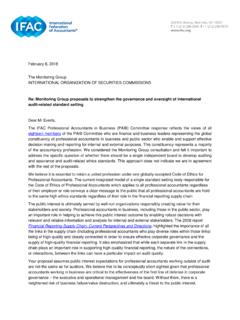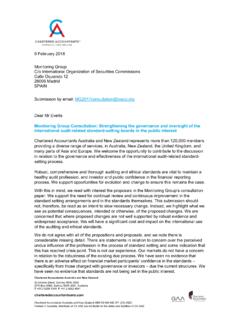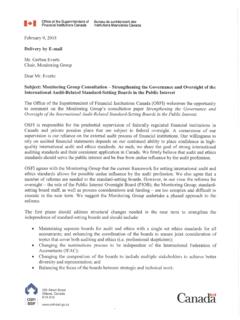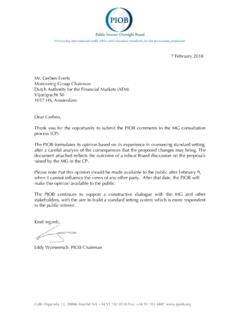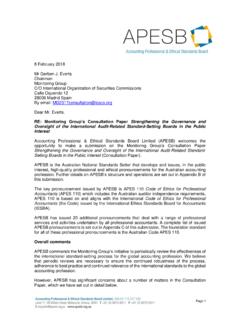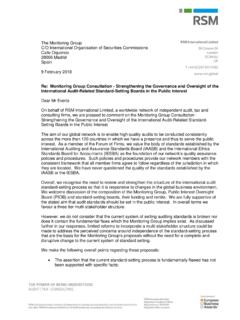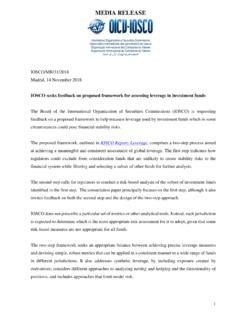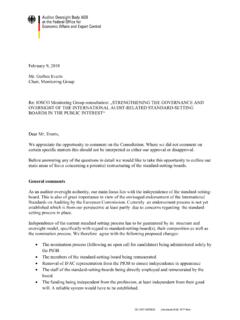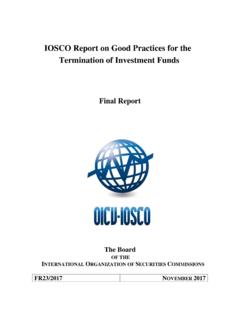Transcription of FR02/2017 IOSCO Research Report on Financial …
1 IOSCO Research Report on Financial Technologies (Fintech) February 2017 1 Table of Contents ABOUT THIS 2 Chapter 1: Focus of this Report and Global Backdrop .. 4 Chapter 2: Alternative Financing Platforms .. 10 Introduction .. 10 Market evolution/ size .. 11 Benefits/ opportunities .. 14 Challenges/ risks .. 15 Regulatory relevance/ responses .. 18 Chapter 3: Retail Trading and Investment Platforms .. 22 Introduction .. 22 Market evolution/ size .. 23 Benefits/ opportunities .. 30 Challenges/ risks .. 31 Regulatory relevance/ responses .. 35 Chapter 4: Institutional Trading Platforms.
2 37 Introduction .. 37 Market evolution/ size .. 37 Benefits/ 42 Challenges/ risks .. 44 Regulatory relevance/ responses .. 46 Chapter 5: distributed Ledger Technologies (DLT) .. 47 Introduction .. 47 Market evolution/ potential areas of application .. 52 Benefits/ opportunities .. 58 Challenges/ risks .. 59 Regulatory relevance/ responses .. 64 Chapter 6: Fintech Developments in Emerging Markets .. 65 Chapter 7: Other Regulatory Considerations .. 70 CONCLUSION .. 75 2 ABOUT THIS Report The Board of the International Organization of Securities Commissions ( IOSCO ) tasked the Committee on Emerging Risks (CER) to collaborate with other IOSCO Committees and lead a study on the evolution of Financial Technologies, including its intersection with securities markets regulation.
3 IOSCO is the international body that brings together the world's securities regulators and is recognized as the global standard setter for the securities sector. Working intensively with the G20 and the Financial Stability Board (FSB) on the global regulatory reform agenda, IOSCO develops, implements and promotes adherence to internationally recognized standards for securities regulation. The term Financial Technologies or Fintech is used to describe a variety of innovative business models and emerging technologies that have the potential to transform the Financial services industry.
4 This Report is the result of extensive collaboration among different IOSCO Committees, with overall coordination by the Vice Chair of the CER. It incorporates substantial contributions from the members of the CER, the Growth and Emerging Markets Committee (GEMC) and the Affiliate Members Consultative Committee (AMCC), including the results from three different surveys: 1) In June 2016, the CER and the GEMC jointly conducted a survey among their respective members to gain further insight on the types of Fintech firms in the respective jurisdictions, key regulatory actions taken by members, and the practices of Fintech firms in onboarding investors.
5 Responses were received from 54 CER and GEMC members to this follow-up survey: 9 respondents were from the Asia-Pacific region, 12 from Africa and the Middle East, 16 from Europe and 17 from the Americas. 2) In May 2016, the CER, AMCC and World Federation of Exchanges (WFE), a member of the AMCC, jointly conducted a survey on DLT. The survey was issued by the WFE to its membership of global exchanges and post-trade infrastructures,1 and by the CER to global DLT consortia, Financial institutions, start-ups, consultancy firms and other stakeholders: 53 responses were received, including 25 from WFE members.
6 13 respondents were from the Asia-Pacific region, 1 from Africa, 2 from the Middle East, 14 from Europe and 23 from the Americas. 3) In December 2015, the GEMC conducted a survey among its members to review the state of development of Fintech in emerging markets, including existing and potential regulatory implications. Responses were received from 41 emerging markets covering diverse geographical locations: 9 respondents were from the Asia Pacific region, 17 from Africa and the Middle East, 7 from Europe and 8 from the Americas. 1 The published WFE survey Report is based on the results of its membership of global exchanges and post-trade infrastructures, and can be found at.
7 3 This Report includes reference to a number of private companies and Financial service providers involved in Fintech. These references should not be construed as an endorsement by IOSCO or by any of its members, nor do they imply any conclusion about the status of any product or service described under applicable law, but instead are offered as illustrative of new business models and emerging technologies currently being contemplated, proposed or offered. We extend gratitude to the below members of the CER, GEMC and AMCC and their colleagues for their contributions to this Report .
8 Australia, ASIC, Adam Judd Brazil, ANBIMA, Julie Ansidei (Chapter Lead)2 Brazil, ANBIMA, Gabriel Porto Brazil, CVM, Wang Jiang Horng Brazil, CVM, Rafael Hotz Arroyo Brazil, CVM, Jorge Alexandre Casara Canada, alberta , ASC, Steven Weimer Canada, Ontario, OSC, Paul Redman Canada, Ontario, OSC, Tarun Patel Canada, Quebec, AMF, Mario Houle Europe, ESMA, Anne Chone France, AMF, Antoine Bargas Germany, BAFIN, Martin Mueller Hong Kong, SFC, B n dicte Nolens ( Report Lead) Hong Kong, SFC, Ron Chiong (Chapter Lead) Hong Kong, SFC, Sara Cheng Hong Kong, SFC, Aoife McGillion IOSCO , Werner Bijkerk (Chapter Lead) IOSCO , Raluca Tircoci-Craciun IOSCO , Gaya Gaadulam Boldbaatar IOSCO , Josafat De Luna Martinez Ireland, CIB, Giuseppe Insalaco Malaysia, SC, Chin Wei Min (Chapter Lead) Malaysia, SC, Neetasha Rauf Malaysia, SC, Shih Ping Liang Netherlands, AFM, Bas Verschoor Spain, CNMV, Ramiro Losada Lopez Turkey, CMB, Barbaros Yal ner , SEC, Sherman Boone (Chapter Lead) , SEC, Emily Gonzalez , SEC, Parul Sharma , FINRA, Kavita Jain , FINRA, Jeanne Balcom , NFA, Kristen Scaletta WFE, Siobhan Cleary 2 Since relocated to the French AMF.
9 4 Chapter 1: Focus of this Report and Global Backdrop Focus of this Report The term Financial Technologies or Fintech is used to describe a variety of innovative business models and emerging technologies that have the potential to transform the Financial services industry: - Innovative Fintech business models typically offer one or more specific Financial products or services in an automated fashion through the use of the internet. By doing so, they unbundle the different Financial services traditionally offered by service providers -- incumbent banks, brokers or investment managers.
10 For example, equity crowdfunding platforms intermediate share placements; peer-to-peer lending platforms intermediate or sell loans; robo-advisers provide automated investment advice; and social trading platforms offer brokerage and investing services. - Emerging technologies such as cognitive computing, machine learning, artificial intelligence, and distributed ledger technologies (DLT) can be used to supplement both Fintech new entrants and traditional incumbents, and carry the potential to materially change the Financial services industry. Figure 1 shows the Fintech landscape mapped across eight categories: payments, insurance, planning, lending and crowdfunding, blockchain, trading and investments, data and analytics, and security.

